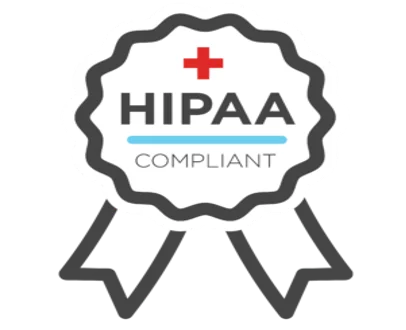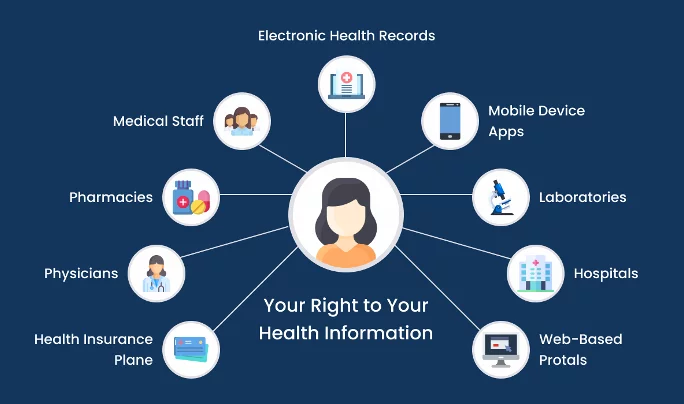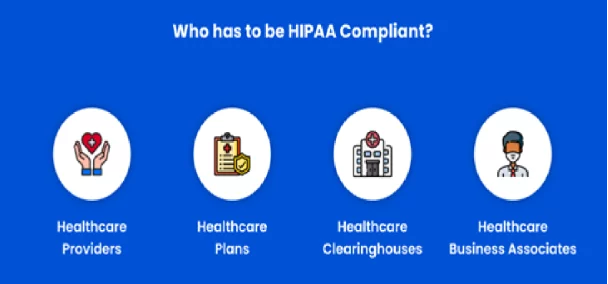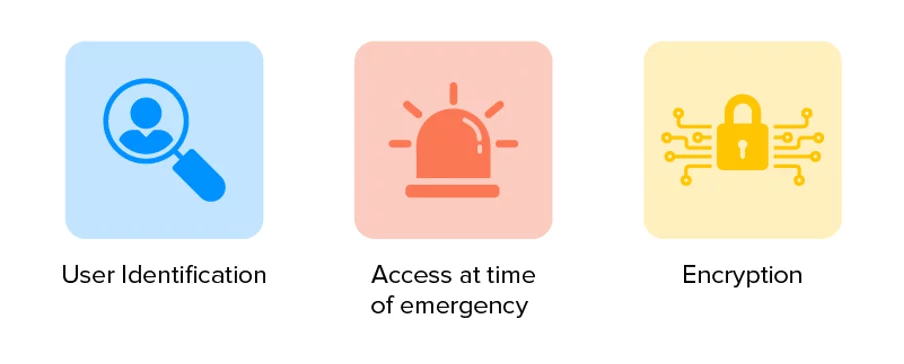The growth of technology has motivated the healthcare industry and web developers to launch healthcare applications that can be beneficial to all users. Not only do these healthcare mobile apps help in connecting patients with their desired doctors, but they also help in booking appointments and purchasing online medicines, thus saving travel time as well as cost. They also provide vital healthcare tips on a timely basis via push notifications.
Web developers who are creating these healthcare apps should have a clear idea about HIPAA compliance to ensure consumer data security against data breaches.
HIPAA compliant app development is extremely essential since there are huge penalties (violations of HIPAA rules – $50,000) levied for violating the HIPAA compliances.
What is HIPAA?

HIPAA (Health Insurance Portability and Accountability Act – 1996) is a federal law that secures consumer (patient) information and health details from data breaches, theft, and misuse. Any disclosure of this information by the healthcare institution requires a nod from the consumer. Image Source
So, in a nutshell, HIPAA ensures data privacy of all patient data either stored or shared via the web. Permitting the consumers to handle and exchange their information as per their wish, is the main motto of the HIPAA act.
What is HIPAA Compliant Act?

HIPAA compliance application development act mainly focuses on ensuring data security and data privacy. HIPAA compliant apps also ensure ongoing health insurance coverage for individuals (job change or jobless) as well as companies.
The HIPAA Privacy Rule ensures that consumer data privacy is maintained since HIPAA apps store consumer data and other confidential medical information. HIPAA compliant apps ensure that consumers have total control in submitting their information as per their will.
The HIPAA Security Rule also ensures that consumer data is completely secured in the storage location as well as during the communication process.
What is PHI (Public Health Information)?
PHI is storage that includes the entire patient history which covers medicinal prescriptions, test reports, billing and insurance details, surgical details, etc. In short, all the medical data related to the patient is recorded here.
HIPAA complaint mobile apps must follow the PHI (protected health information) guidelines which give patients ample rights to handle their private data.
HIPAA compliance application development for mobiles or any other smart gadgets is a complex process. The sole reason for the complexity is that PHI also takes into consideration the future health of the individual and collects data. Also when a developer makes an app, it should be secured with code signing certificates, which assures code integrity.
To secure PHI, HIPAA has made some modifications of which securing PHI from third-party companies and other vendors is pivotal and must be incorporated into the app.
What is CHI (Consumer Health Information)?
CHI is the data that is accessible to the general public. This data comprises health records, medical conditions, health products, and services. It is more of an awareness program that permits laymen to analyze the medical data and review it.
CHI necessitates all the software/hardware tools that communicate with the health fraternities.
What Makes HIPAA Compliance Important?
As stated above, the internet is a risky place. Phishing attacks, cyber threats, and data breaches are always on the rise, and hence HIPAA compliant applications are a must.
What does HIPAA Compliant mean?
HIPAA law ensures that all healthcare companies, as well as the service providers, share a cordial, healthy, and trustworthy relationship with their patients. Mentioned below is how this compliance works best for varied entities. Let’s check them out.
HIPAA for Hospitals:
- This act ensures that all records on paper are eliminated and the same is stored in electronic form.
- It helps streamline all the administrative processes, thus enhancing efficiency.
- The most important factor of HIPAA is data privacy and security which is ensured for all the shared medical data.
HIPAA for Patients:
- The assurance of data security is the best gift given by HIPAA to their patients. Since patient approval is needed before sharing their medical data, they are assured about the security of their data.
- Nil access to administrative or medical staff is a blessing in disguise.
- Patients have complete control of data sharing.
- Patients can easily access their medical documents.
Does my app need to be HIPAA Compliant?
Many healthcare industries ask the above question since they are ignorant about HIPAA compliances and their importance.
Yes, your app needs to be HIPAA compliant.
HIPAA compliance is essential for all the online applications of the healthcare industry. What makes this compliance essential is the security it offers as well as the heavy penalties which are levied in case of non-compliance with the HIPAA act.
When You Need to Build a HIPAA Compliant Application:
Let me explain the same with an example.
Imagine that a healthcare service provider has approached you for developing a healthcare mobile app. Their main aim is to record patient details wherein secrecy needs to be maintained. They also need to track patients’ eating habits and other health issues, including regular medicine intake, etc.
All this information can be helpful to patients and the same can be exchanged by the service provider.
Such apps need to comply with the HIPAA act. These HIPAA secure apps ensure data privacy and hence patients feel secure in sharing their information.

Health insurance companies, healthcare clearinghouses, health care providers, etc. are some ideal industries that need to abide by the HIPAA act.
When You Don’t Need to Build a HIPAA Compliant Application:
Here the example is a bit different. Imagine that a health care company has approached you for a fitness app that records consumer height, weight, name, etc.
Such apps do not require to be HIPAA compliant since the information is neither confidential nor requires any secrecy. The same is solely used for user reference and does not require any sharing.
Since HIPAA applies to covered entities, workers, employers, etc. need not comply with HIPAA rules. Community health centers, small businesses having less than 50 employees, charity institutions, life insurance companies, etc. need not build a HIPAA compliant application.
How to Build a HIPAA Compliant Mobile App?
HIPAA compliant mobile app development is a grueling task since many compliances need to be followed. Becoming HIPAA compliant means that the app has:
- Security algorithms for data privacy
- Use of high-end encryption schemes for data exchange
- Incorporation of technical terms to ensure data privacy
- Incorporation of authentication methods for safeguarding data against cyber threats and data breaches.
Mobile app HIPAA compliance needs to be secured physically as well as technically. A brief explanation of the same follows.
- Physical Protection of the Application:
HIPAA compliant mobile app development for the healthcare industry needs physical protection of the application.
App’s physical protection refers to:
- High-end app backend protection
- Security of hosting servers of software apps
- Secured data storage on a database server
- Securing data of healthcare wearables (electronic wearable devices – Fitbit) which are linked to smartphones
- Technical Protection of the Application:
HIPAA compliant app development companies need to ensure technical protection of the application also.
App’s technical protection refers to:
- Execution of authentication system to verify actual users
- Implementation of user identification system via biometrics
- Automatic logging off software when unused
- Elimination of exchange of PHI data via emails and other notifications
- Ensuring strong backups
- Get Expert Help:
The complexity of the HIPAA compliance application development process has compelled many healthcare industries to opt for expert help. Expert healthcare developers can help in building HIPAA compliant software and application by analyzing the HIPAA rules and regulations.
- Analyze Patient Data:
Health care companies need to analyze patient data which is either stored or shared. They need to check out which data is essential as per PHI and which data needn’t be stored.
- Create the Application:
The last step is to create the application after incorporating the physical and technical protections. Create an app by abiding with HIPAA rules and taking into consideration client requirements.
While building HIPAA compliant software, the developers need to ensure that all the government regulations are taken care of.
- Testing the App:
After building HIPAA compliant software, the same needs to be tested for authorization and security.
- Checklist to make an App HIPAA Compliant:
Many app developers keep on juggling their minds to decide how to make an app HIPAA compliant. This is solely for those who are ignorant about the same.
We have created a HIPAA compliant software development checklist which needs a tick on all the below-stated factors before using the same.
- Data Encryption before Sharing and Exchange:
Encryption is pivotal for any transfer or exchange of electronic data. Be it the hosting provider or the cloud solution, installing an SSL (Secure Socket Layers) certificate is a must. Ensure that the same is properly configured to prevent intruders from gaining access to app data.
- Encryption of Data Storage:
Data storage houses also need to ensure data confidentiality and security by implementing HTTPS (hyper-text transfer protocol secure) protocols.
Intruder access or external users should be prevented from gaining access to cloud storage or storage houses. An extra layer of security can help in preventing such catastrophes.
- Manage and Verify User Identity & Access:
Proper management of user identities and accesses is a must to ensure that the patient data does not fall into fake hands. Anyone accessing the medical data needs to be approved by the client and needs to have user IDs and passwords for the same.
Limiting login attempts and using biometrics can help in preventing the misuse of data.
- Maintaining Data Integrity of Stored Data:
Apart from ensuring data integrity, care should be taken to ensure that the data is not lost or compromised in the storage location.
- Proper Disposal of Stored Data:
Healthcare data is vital and hence it needs safe disposal. Web developers need to instill features wherein automatic deletion of stored data is possible.

While incorporating HIPAA compliance for web applications, ensure to include certain features for strong data security.
- User Identification:
User login via email is risky since there are chances of data being breached. Hence HIPAA compliance specifies user login via password, PIN, or any other biometric identification.
Always prefer these entrance gates for user access and request your developer for the same.
- Access during Emergencies:
Emergencies pay a surprise visit and can disrupt your network. Data access needs to be ensured in such situations. Include this essential feature in your HIPAA app.
- Encryption:
Data encryption takes place when an SSL certificate is installed. Encryption converts the data into a coded form that is non-readable and hence secured from intruders.
Encryption for healthcare data is essential during the data exchange process via emails or data storage secured in the cloud.
A few more features of the HIPAA App include:
- Self-audit on proper documentation of healthcare records, check on security gateways, and implementation of rules and regulations or HIPAA act.
- Filling security loopholes if any after viewing the self-audit reports.
- Creating and modifying restoration plans if needed.
- Ensuring employee training processes for smooth functioning of the app
- Incorporating an incident response management system for tracking data breaches and unauthorized entries.
- Technologies used for HIPAA App Development:
Varied technologies contribute to creating a HIPAA compliant application.
- Database Management
- Programming Language
- Self-audit on Login Controls and Testing the App
- Deployment Software
- Data Migration Software
- Log Maintenance & Monitoring of Unusual Activities
- Storage & Backup Systems
How Much Does It Cost to Build a HIPAA Compliant Application?
Many factors are responsible for increasing or decreasing the cost of HIPAA apps. The app development company is also a major factor that contributes to the cost factor. The app development cost also depends on the level of complexity involved as well as the type of security levels needed for securing the app data.
The size of the organization as well as the count of user roles (doctors, patients, administrators, healthcare staff, etc.) too is responsible for deciding the cost factor.
Conclusion:
Your healthcare app needs robust data security and the same is possible if it is HIPAA compliant. A HIPAA compliant app is proof that you are incorporating all the rules and regulations of the HIPAA act which are set by the concerned personnel.
These rules are set taking into consideration the physical, technical, and administrative safety of the app apart from ensuring data integrity.
Follow the above-stated guidelines and built a HIPAA compliant app to secure your data and app from intruders.
FAQs:
- Which apps are HIPAA compliant?
A few of the best HIPAA compliant phone apps include OhMD, TigerConnect, Halo Health, Spok, etc.
OhMD is a reliable HIPAA compliant app that is trusted by approximately 3,00,000 healthcare personnel. This app is a text messaging platform that permits sending and receiving medical forms, surveys, prescriptions, etc.
- Do apps need to be HIPAA compliant?
HIPAA compliant apps are all about user identification, user verification, data encryption, and access to data in case of contingencies. In this era where cyber threats are always on the move, HIPAA compliant apps are essential for maintaining data secrecy.
- How do I make an app HIPAA compliant?
Ensure to add all the essential features of the HIPAA act and go through the checklist stated in the above article for creating a trustworthy and secured HIPAA compliant app.



